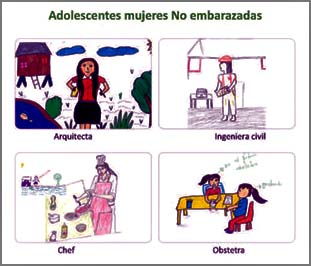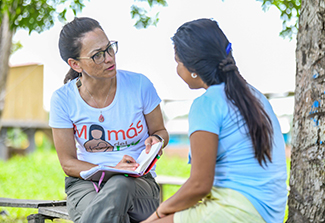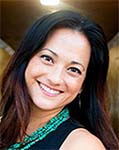Empowering women and children from Nepal to the Amazon | Lisa Labita Woodson (Nepal)
RPCVs in the news —
Dr. Lisa Labita Woodson’s path to global health research began somewhat by accident. Initially she aspired to be a poet or an ecologist. Her journey took a dramatic turn after she joined the Peace Corps (Nepal 2004). Assigned as a science teacher to Nepal, she witnessed a tragic joint suicide of one of her students and their partner, which was due to an out-of-wedlock pregnancy. This experience compelled Woodson to seek mental health consultations and reproductive health education for her students.
She was eventually evacuated from Nepal due to civil unrest, and went on to —
- Pursue a master’s degree in global health at the University of Arizona, where she later earned her PhD.
- Her experiences in Nepal ignited in her a passion that led her around the world.
- In Senegal, she studied the feasibility of using potato starch as a dietary supplement during humanitarian crises.
- In Thailand, she researched HIV/AIDS knowledge among the Hmong tribal community.
- Later, a Fulbright Fellowship brought her back to Nepal to focus on health messaging from schools to households.
- These experiences paved the way for Woodson’s Fulbright-Fogarty Fellowship during her Ph.D. work in Peru.
“I spent much of my career doing quantitative research, and I wanted to shift to qualitative research to learn something new. The Fulbright-Fogarty fellowship was a great opportunity to expand my scope,” she added.
A new project
Beginning her project in 2022 in the Peruvian Amazon, she aimed to understand the impact of COVID-19 lockdowns on school dropout rates and adolescent pregnancy. Partnering with Mamas del Río, an initiative that works to reduce maternal and infant mortality in remote communities in the Peruvian Amazon led by her mentor and from Fogarty Global Health Fellow and Scholar, Dr. Magaly Blas, Woodson focused on promoting equitable and sustainable access to essential healthcare for rural communities in the region.
The first phase of Woodson’s project involved interviewing 41 individuals, including adolescents, and asking them, as part of the conversation, to draw their future aspirations. The drawings revealed compelling insights. Pregnant girls depicted occupations more traditionally held by women such as obstetricians, nurses, or teachers, while non-pregnant girls envisioned a broader range of careers including architect, engineer, and chef. Boys on the whole saw themselves in diverse roles, from doctors to tour guides, not limited to their Amazonian context. Interestingly, adolescents across all groups did not depict themselves as mothers or fathers. “The depth of information from those drawings was truly compelling,” Woodson reflected.

As part of Woodson’s work with teens in the Peruvian Amazon, she asked them to draw their future aspirations. Non-pregnant girls envisioned a broader range of careers. In this set of drawings, teens drew (clockwise from top left): architect, civil engineer, obstetrician, and chef.
In her second year, Woodson surveyed 167 adolescents across the Peruvian Amazon. While the research did not find an increased rate of adolescent pregnancy due to COVID-19 school closures, it did reveal that youth who experienced hunger during the pandemic were more likely to drop out of school.
“I think we’ll see changes downstream related to COVID that were really detrimental to many of these kids,” Woodson said. “A lot of them ended up dropping out of school and are at higher risk of adolescent pregnancy.”
Climate Change
While Woodson and her team are hyper focused on the issues of reproductive education and health, the effects of climate change are simultaneously wreaking havoc on the communities they study making the roadmap to intervention even more complex. During her time in the Amazon in 2023, Woodson was witness to one of the most devastating droughts the Amazon has ever seen. This experience was pivotal in refocusing her understanding of climate change as “affecting everything — women’s health, reproductive health, food security,” yet at the same time it is not gender neutral because it primarily affects females.
Today
Today, Woodson and her team distribute in the region informational booklets, tailored to adolescents, that include the data from her study as well as information about reproductive health and contraception. They’re also engaging community leaders and health workers to develop locally viable interventions. Despite the challenges of working in isolated Amazonian areas, she is determined to find effective solutions.

Dr. Lisa Labita Woodson interviews a woman in the Peruvian Amazon as part of her work with Mamas del Río. Photo courtesy of Mamas del Río
“If we’re moving forward in global health, we need to focus on empowering women, especially marginalized women,” Woodson emphasized. “Focusing on women will change the life trajectories of their children and ultimately make a huge difference.”
Launching Beyond Global Health
Outside of her work in Peru, Woodson has launched the Beyond Global Health initiative with her mentor, Dr. Purnima Madhivanan, and fellow Fogarty LAUNCH alumna, Dr. Shameka Poetry Thomas. This project uses art, poetry, prose, and photography to discuss global health issues creatively, elevating participant voices and promoting social change.
Her advice to aspiring global health researchers is to find a good mentor. “Find that mentor who’s willing to give you their time. That’s one of their most valuable commodities. If they’re willing to do that, then you’re on a good path.”

Anawesome story! I will share it with my children and grandchildren.